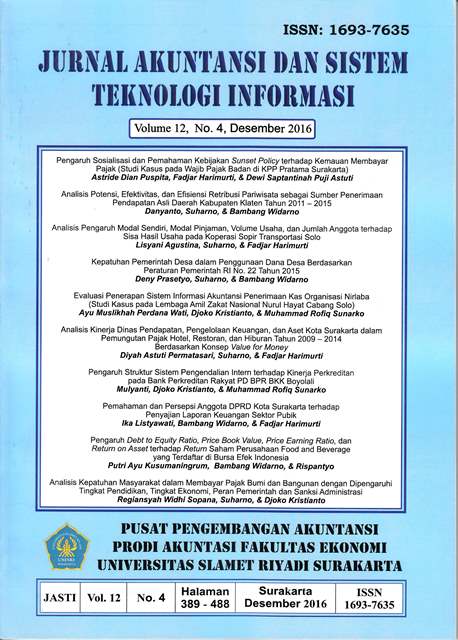ANALISIS KEPATUHAN MASYARAKAT DALAM MEMBAYAR PAJAK BUMI DAN BANGUNAN DENGAN DIPENGARUHI TINGKAT PENDIDIKAN, TINGKAT EKONOMI, PERAN PEMERINTAH DAN SANKSI ADMINISTRASI
Abstract
The purpose of this study was to analyze the effect of educational level, economic level, the role of government and administrative sanctions on compliance society on pay property tax. This research is a case study with a population of property taxpayers. A sample of 95 taxpayers Kismantoro Wonogiri and 97 taxpayers in the Mojosongo Kadipiro Surakarta with purposive sampling technique. Methods of data collection used questionnaires, documentation and literature. Data were analyzed used multiple linear regression and independent sample t-test. The results showed that the level of education has positive but not significant effect on compliance society on pay property tax. Economic level has positive and significant effect on compliance society on pay property tax. The role of government has positive and significant effect on compliance society on pay property tax. Administrative sanctions has positive and significant effect on compliance society on pay property tax. Education level, economic level, the role of government and administrative sanctions significantly effect on compliance society on pay property tax simultaneously. The results independent sample t-test showed that there is no significant difference on pay property tax at compliance society Kismantoro Wonogiri with Mojosongo Kadipiro Surakarta.
Keywords: Education Level, Level Economic Role of Government, administrative sanctions, Compliance on pay property tax.
Downloads
Published
Issue
Section
License
Authors who publish this journal agree to the following terms:
- Authors retain copyright and grant the journal right of first publication with the work simultaneously licensed under a Creative Commons Attribution License that allows others to share the work with an acknowledgement of the work's authorship and initial publication in this journal.
- Authors can separately make additional contractual arrangements for non-exclusive distribution published by the journal (e.g., publish it in a book), with an acknowledgement of its initial publication in this journal.
- Authors are allowed and encouraged to send their work via online (e.g., in the institutional repositories or their website) after published by the journal.










